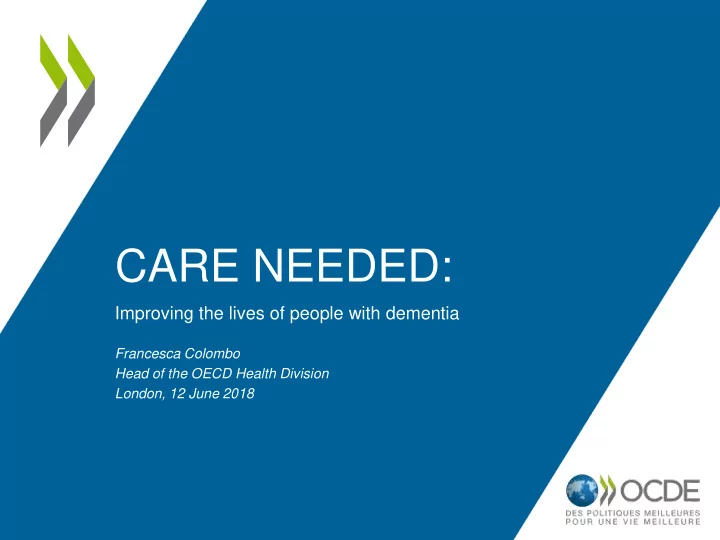

CARE NEEDED: Improving the lives of people with dementia Francesca Colombo Head of the OECD Health Division London, 12 June 2018
Dementia affects million of people in OECD, and the numbers will continue to rise Dementia prevalence is high and rising with ageing populations 45 People with dementia per 2017 2037 1 000 population 40 35 30 25 20 15 10 5 0 Source: OECD Health Statistics 2017
Policy attention and action have grown • First ever G8 Summit on dementia mobilised international commitment • 22/35 OECD countries now have national dementia plans or strategies Dpa Picture Alliance – Andy Rain
…But evidence shows that we are still failing people with dementia… …and there is a risk that political attention moves away.
COUNTRIES ARE POORLY EQUIPPED TO DIAGNOSE DEMENTIA
Improvements needed to identify dementia Access to diagnosis • Less than half of people with the condition are diagnosed • Primary care serves as the first point of contact for memory problems in 26 OECD countries Diagnostic quality • Many people with dementia do not have more than a general diagnosis of dementia recorded • 16 countries have developed clinical guidelines for dementia Screening for dementia • 4 countries currently offer cognitive screening • Uptake can be low, even when offered
Data remains poor <40% of OECD countries can estimate diagnosis rates Fewer than 1 in 5 OECD countries regularly link primary care data 6 OECD countries have developed dementia registries to help fill data gaps
FRAGMENTED INITIATIVES IN THE COMMUNITY
Fragmented community care Weak post-diagnostic support: Post-diagnostic care pathways have been developed for people living with dementia in 9 countries, but adherence varies Insufficient action for dementia-friendly communities 90% of OECD countries have dementia-friendly communities, but they rely on local associations and NGOs, and remain ad-hoc Support for informal carers is sorely lacking interventions that support the caregiver’s own personal wellbeing are critical, but underprovided
POOR STANDARDS OF CARE FOR PEOPLE WITH ADVANCED DEMENTIA
Help needed for people with advance dementia Training for care workers is insufficient The required level of dementia training for home and residential care workers is very low Access to dementia-suitable care facilities is weak Small scale living communities not widely available; four countries (Denmark, Ireland, UK, Norway) have developed guidelines to promote dementia-friendly design Hospitals are ill-adapted for the needs of people with dementia Poor coding, poor management of condition
Per 1 000 persons aged 65+ 100 10 20 30 40 50 60 70 80 90 0 poor care persists High rates of antipsychotic use indicate 29.7 30.5 30.9 31.3 33.7 34.6 2015 45.8 47.6 2011 47.8 51.7 55.7 56.5 58.2 65.0 70.4 75.0
Lack of comparable data across the full pathway of care 22 OECD countries We have evidence have recently to support best developed practice in some dementia policies areas and strategies But most countries have very few Very difficult to indicators of make international dementia care; lack comparisons of of robust, dementia care systematic data
Key recommendations Identifying dementia – Scale-up training and support for physicians, particularly in primary care – Improve dementia coding and data linking, from primary care to hospital Caring in the community – Develop and disseminate best practice dementia-friendly communities guidelines – Strengthen post-diagnostic pathways, care coordination and case management for people with dementia, especially for complex dementia – Scale-up training and support for informal carers Improving quality of care for people with advanced dementia – Strengthen dementia management skills and training for care staff – Develop and disseminate best practice dementia-friendly building guidelines – Consider financial and professional incentives for care staff with dementia training – Develop and regularly monitor key quality of care measures, including antipsychotics prescribing
Thank you for listening Download the report https://oe.cd/dementia-care- needed Follow us on Twitter @OECD_social Email me Francesca.COLOMBO@oecd.org
Recommend
More recommend